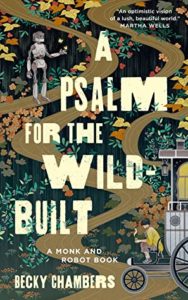
This summer is quickly taking me from not having read any Becky Chambers to reading three of her books, given a late-series Hugo nomination for Best Novel and a series-opener nominated for Best Novella. But A Psalm for the Wild-Built may be the novella that I had heard most about in 2021, so I was excited for the chance to give it a try.
I knew enough about Chambers to expect a cozy story with no clear antagonist, and A Psalm for the Wild-Built fulfilled those expectations. It takes place in a world where the sudden development of machine sentience precipitated a sea change in human society. Humanity retreated from far-flung factories, letting nature reclaim half the available land area, and focused on sustainability of the half in their care. The newly sentient robots, given an opportunity to set their own course, retreated from human society to study nature. And they were never heard from again. Or at least not until a monk named Dex had a crisis of purpose and pivoted from their city-bound monastery to a position as a tea monk—a sort of traveling therapist that listens to people’s troubles over cups of tea.
If the author name didn’t signal coziness, the premise should suffice. And it is not inaccurate. The primary conflict is between Dex and their own feeling that there must be something more to life than the role they fill in the monastery. In their travels, Dex encounters Mosscap, a robot who had volunteered as an emissary to humanity and serves as traveling companion in the final sections of the novella. And there are certainly misunderstandings across cultures, even the occasional disagreement, but the relationship between Dex and Mosscap is primarily one of mutual learning and attempts to aid each other in their goals.
Having read this shortly after Chambers’ 2014 debut, the first thing that struck me was the improvement in writing quality. The Long Way to a Small, Angry Planet wasn’t exactly held back by its prose, but it’s turned into a strength in A Psalm for the Wild-Built, breathing real life into the world. She hasn’t abandoned the easy-to-read, contemporary style, but the flow has improved immensely and there are moments of real beauty in the writing.
The story being told, on the other hand, has its strengths and weaknesses. It was clear from before I even picked it up that this wasn’t going to be a plot-heavy book, but a lot rests on how easily the reader can relate to an extremely privileged lead struggling with a feeling of aimlessness. To be honest, I think that’s a relatable struggle for plenty of people in my own (American) context, and I found Dex easy to understand, even if I was sometimes frustrated by their misguided refusal to ask for help.
The introduction of Mosscap supplemented Dex’s search for meaning with a Chambers mainstay: developing understanding across cultures. And the robot culture that birthed Mosscap is unfamiliar, even to those who have read their fair share of friendly AI stories. There were aspects that might’ve stretched my suspension of disbelief—a robot being bad at math, for instance—but I appreciated a fresh imagining of what AIs could be. The conflicts between Dex and Mosscap as they struggled to understand each other were all quite short-lived and didn’t really provide the oomph to take the novella to another level, but they made for a cozy and enjoyable read.
What I found less satisfying was the resolution to Dex’s animating concern. The repudiation of the need to have a vocation that gives meaning to life is refreshing in a culture with unhealthy attitudes towards work, and I felt carried some echoes of Ecclesiastes. But for all that it was presented optimistically, it included a gesture towards nihilism that made the optimism ring hollow. I can’t blame an author for espousing ideas on the meaning of life that are different from my own, and A Psalm for the Wild-Built certainly did the work in sorting through thorny questions of meaning. But it’s also hard to feel the intended comfort in a conclusion that doesn’t strike me as particularly comforting.
Overall, the quality writing, worldbuilding, and characters make A Psalm for the Wild-Built well worth reading—as long as you don’t need your novellas to be exceptionally plot-heavy—even if I found some of the optimism a tad hollow.
Recommended if you like: Becky Chambers, low stakes, mid-life (or possibly quarter-life) crises.
Can I use it for Bingo? It’s hard mode for Mental Health and is also a Book Club book.
Overall rating: 16 of Tar Vol’s 20. Four stars on Goodreads.
